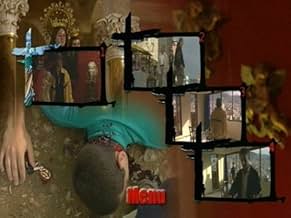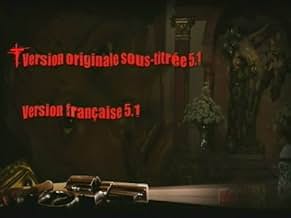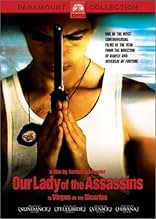IMDb RATING
6.8/10
4.4K
YOUR RATING
The writer F. Vallejo returns to Medellin after an absence of over 30 years. He meets 16-year-old Alexis. Alexis is the kind of killer who knocks people off on command. The two are immediate... Read allThe writer F. Vallejo returns to Medellin after an absence of over 30 years. He meets 16-year-old Alexis. Alexis is the kind of killer who knocks people off on command. The two are immediately attracted to each other.The writer F. Vallejo returns to Medellin after an absence of over 30 years. He meets 16-year-old Alexis. Alexis is the kind of killer who knocks people off on command. The two are immediately attracted to each other.
- Awards
- 3 wins & 3 nominations total
Featured reviews
Barbet Schroeder's Our Lady of the Assassins is a perplexing film. Yet, it is ultimately rewarding in ways that most films aren't.
Shot in high definition digital video, the film has an immediacy to it that cannot be simulated by film. At first, the immediacy seems to cheapen the look and one wonders what Schroeder was thinking when he decided to undertake this format. Yet as the complexity of the story progresses, we seem to be "taken in" by the video's hypnotic effect and we realize that we are viewing a medium with its own look, feel and characteristics and we accept it.
About an older man who befriends and enters into a relationship with a young ex-gang member, the story takes a while to unfold. In the beginning it seems all but pointless, yet within the hour, we are caught up in a film of overwhelming depth and emotional power. Schroeder deserves tremendous credit for having the courage to make a movie in which the main character openly denounces the church and where themes of political corruption and anarchy in a real world setting actually exist.
Most disturbing is that the themes in this movie ring true with an authenticity that cannot be challenged. We are simultaneously horrified yet held captive by a reality which we don't want to believe exists but that we know already does, not only in Colombia, where the film is set, but elsewhere as well. Schroeder is a master here of making the "city" of Medellin just as much a character as the protagonists. He charges the environment with an electricity that seems to pervade the screen and crawl into our psyches.
Unfortunately it is the medium itself which may prevent Our Lady of the Assassins from becoming a commercial success or as being taken seriously by a lot of people. But film purists and those who enjoyed the gritty realism of similar films like Pixote and Santa Sangre, should love this one.
Shot in high definition digital video, the film has an immediacy to it that cannot be simulated by film. At first, the immediacy seems to cheapen the look and one wonders what Schroeder was thinking when he decided to undertake this format. Yet as the complexity of the story progresses, we seem to be "taken in" by the video's hypnotic effect and we realize that we are viewing a medium with its own look, feel and characteristics and we accept it.
About an older man who befriends and enters into a relationship with a young ex-gang member, the story takes a while to unfold. In the beginning it seems all but pointless, yet within the hour, we are caught up in a film of overwhelming depth and emotional power. Schroeder deserves tremendous credit for having the courage to make a movie in which the main character openly denounces the church and where themes of political corruption and anarchy in a real world setting actually exist.
Most disturbing is that the themes in this movie ring true with an authenticity that cannot be challenged. We are simultaneously horrified yet held captive by a reality which we don't want to believe exists but that we know already does, not only in Colombia, where the film is set, but elsewhere as well. Schroeder is a master here of making the "city" of Medellin just as much a character as the protagonists. He charges the environment with an electricity that seems to pervade the screen and crawl into our psyches.
Unfortunately it is the medium itself which may prevent Our Lady of the Assassins from becoming a commercial success or as being taken seriously by a lot of people. But film purists and those who enjoyed the gritty realism of similar films like Pixote and Santa Sangre, should love this one.
Medellin is a dangerous city in more ways than one is lead to believe. At the time of the action, Pablo Escobar's empire has been dismantled and his loyal soldiers are scattered all around the city engaging in a game of death, revenge and petty vendettas. There is no reverence for life in a place that has seen violence on a daily basis and where children have access to guns for protection in order to survive in that environment.
Barbet Schroeder, the German director, expands on Fernando Vallejo's novel, which the author adapted for the screen, resulting in a highly violent and bloody film that is disturbing, as well as true.
Fernando, the older gay man who comes back to his native city of Medellin, quickly finds a boy to satisfy his needs. Alexis, the young man, is seen at first at the all-male brothel where he is offered by the pimp to Fernando. Alexis turns out to be something the older man didn't expect. This is a boy that is savvy in the ways of how to survive in the city, who clearly takes an interest in the older, and richer Fernando.
Alexis is a marked man and it's only a matter of time; his days are numbered because there are other youths behind him that will do whatever in their power to eliminate him. Fernando can't believe what his city has become, but he has no desire to go away again. When Alexis is killed, Fernando mourns his death until Wilmar, another young gay man appears in his orbit. Little prepares Fernando to realize who Wilmar is really.
Fernando's comments on the situation in his city, as well as in the Colombian reality, are the basic themes of the film. While one side of him cries for that old place he knew as a child, he welcomes this new metropolis full of danger and people that attracts and repulses him at the same time.
German Jaramillo appears to be the alter ego for the writer, Fernando Vallejo, whose story seems to resemble that of the Fernando in the novel and in the film. Mr. Jaramillo's take on Fernando keeps him away from the confrontations between his young lovers and what he thinks is right. He never passes judgment on what the young people are doing, yet he is instrumental for providing the bullets that Alexis needs to defend himself. The other two young actors, Anderson Ballesteros and Juan Diego Restrepo, play Alexis and Wilmar respectively.
Barbet Schroeder has directed the film with all its realism showing us a society in which all hope seems to have abandoned the citizens of the city.
Barbet Schroeder, the German director, expands on Fernando Vallejo's novel, which the author adapted for the screen, resulting in a highly violent and bloody film that is disturbing, as well as true.
Fernando, the older gay man who comes back to his native city of Medellin, quickly finds a boy to satisfy his needs. Alexis, the young man, is seen at first at the all-male brothel where he is offered by the pimp to Fernando. Alexis turns out to be something the older man didn't expect. This is a boy that is savvy in the ways of how to survive in the city, who clearly takes an interest in the older, and richer Fernando.
Alexis is a marked man and it's only a matter of time; his days are numbered because there are other youths behind him that will do whatever in their power to eliminate him. Fernando can't believe what his city has become, but he has no desire to go away again. When Alexis is killed, Fernando mourns his death until Wilmar, another young gay man appears in his orbit. Little prepares Fernando to realize who Wilmar is really.
Fernando's comments on the situation in his city, as well as in the Colombian reality, are the basic themes of the film. While one side of him cries for that old place he knew as a child, he welcomes this new metropolis full of danger and people that attracts and repulses him at the same time.
German Jaramillo appears to be the alter ego for the writer, Fernando Vallejo, whose story seems to resemble that of the Fernando in the novel and in the film. Mr. Jaramillo's take on Fernando keeps him away from the confrontations between his young lovers and what he thinks is right. He never passes judgment on what the young people are doing, yet he is instrumental for providing the bullets that Alexis needs to defend himself. The other two young actors, Anderson Ballesteros and Juan Diego Restrepo, play Alexis and Wilmar respectively.
Barbet Schroeder has directed the film with all its realism showing us a society in which all hope seems to have abandoned the citizens of the city.
I saw the film at the Jerusalem Film Festival. It was a rather late screening, but the viewers were glued to their seats. It's a very gripping movie and extremely subversive in themes, language and visuals. It's very anti current-day Colombia, and no wonder the production didn't go very smoothly. Still I admire the support the film got from `official' institutions in Medellion. It's subversive in themes, because we basically have a gay couple, an older man (about 40-50) who indulges in having sex with minor boys (who do this willingly, and yet, it's rather shocking to the average viewer) in return for financial support, or rather indulging the boys in whatever they want to do. The couple goes around the city and is critical of every facet of the city and rightly so yet the tone is overtly cynical and `evil'. The lead boy, Alexis, goes around and kills whomever is threatening him and his sugar-daddy I think he executed 4 people once a confrontation was about to happen, and 4 more were other kids who were after him. S this shooting spree is depicted in a somewhat accepting manner, as if this is the way to do these things in Colombia. They ridicule almost every aspect of life church, police, government, the drug lords, poor and beggars, the bourgeoisie, other gays, and even themselves. In that respect, it's a very Pasolini movie, although the realism here is a real one and not made for the sake of a socialist agenda. The writer and his two boy-lovers are very lost, although they always know where they are, and the ending is pretty bad, as expected. The film shows no hope for the Colombian people, as they are stuck in a country ran by corrupt officials, gangs and drug lords. The writer has great lines, one of my favorite was about him hating people who whistle, because they shouldn't try and imitate the art that was given to the birds
A good movie, with a 7/10 as far as I can say. Acting-wise since I don't speak Spanish, it was credible to my ears, though the boys did seem to quote their lines mechanically at times.
Our Lady of The Assassins will have you either loving it or hating it. It polarizes because it never compels as a movie itself, but is laid out before each person, needing him or her to internalize the film. The movie speaks of living in a Columbian drug town and the irony as people get shot everyday by moral-less teens set against the beautiful city and sky. But the main character, an old gay writer, is never engaging or as articulate and thoughtful as one would expect from the "best known grammarian" from Columbia. In fact, as grammar is rigidly structured, so are the writer's banal comments about 'time being what you want it to be' and 'life only being lived to die.' The musings have been heard before, but with greater clarity and depth. There is no epiphany to be associated with any of his sayings. However, he meets a young former gang member, marked for death, named Alexis and they fall in love. The film is so detached that their love is the closest element to emotion, and still one cannot understand why this boy would sleep with a man who incessantly whines constantly. The shocking life in Medellin is the most compelling aspect of the movie and the movie still has points, it's just that they are not nearly poignant enough. They are shown by the director, but never cohesively placed into an argument. I really wished I could have liked this movie.
The film is set in Medellin (Colombia) where an old gay man called Fernando (Jaramillo) who after many years ago he has gone back . In a homosexual brothel meets and befriends Alexis (Anderson) a teen at 16 years old and starts a romance with him . He's a gunboy who kills too easily , he unscrupulously murders everybody create him problems . Fernando is struggling to flee him the ominous underworld plentiful of dangers , odds and murders .
The picture deals about adolescents and children from Medellin . This city was under incredible violence and ruled the strongest law . Pablo Escobar has been detained and his drugs empire has been dismantled and the factions are spread engaging war each other and making an orgy of vengeance and killings . The movie is a thought-provoking and intelligent studio of juvenile paupers and an unflinching observation at the underbelly of Medellin city where teens and children are dragged into a life of crime become assassins . The flick contains emotions , records , strong violence and a little bit of critical social . The tale belongs a group of films which describe the unfortunate life of south-American youth as ¨Pixote¨ (Hector Babenco) and ¨City of God¨ (Fernando Melleires). Principal actors interpretation are outstanding , in spite of being novels players . Jaramillo is magnificent though relies heavily on the continuous philosophical speeches about his sense of life . The picture is an adaptation based on a semi-autobiography novel by Fernando Vallejo . Barbet Schroeder direction is awesome and stylish , he's a notorious Hollywood director (Murder by numbers , Reversal of fortune) realizing rightly this video- film .
The picture deals about adolescents and children from Medellin . This city was under incredible violence and ruled the strongest law . Pablo Escobar has been detained and his drugs empire has been dismantled and the factions are spread engaging war each other and making an orgy of vengeance and killings . The movie is a thought-provoking and intelligent studio of juvenile paupers and an unflinching observation at the underbelly of Medellin city where teens and children are dragged into a life of crime become assassins . The flick contains emotions , records , strong violence and a little bit of critical social . The tale belongs a group of films which describe the unfortunate life of south-American youth as ¨Pixote¨ (Hector Babenco) and ¨City of God¨ (Fernando Melleires). Principal actors interpretation are outstanding , in spite of being novels players . Jaramillo is magnificent though relies heavily on the continuous philosophical speeches about his sense of life . The picture is an adaptation based on a semi-autobiography novel by Fernando Vallejo . Barbet Schroeder direction is awesome and stylish , he's a notorious Hollywood director (Murder by numbers , Reversal of fortune) realizing rightly this video- film .
Did you know
- TriviaGiven the fact that Anderson Ballesteros did a great job portraying a tough hitman with street knowledge, all the roles he got later were pretty much the same, for example, playing as Pablo Escobar's main hitman on "El Patrón del Mal"
- How long is Our Lady of the Assassins?Powered by Alexa
Details
- Release date
- Countries of origin
- Official site
- Languages
- Also known as
- Our Lady of the Assassins
- Filming locations
- Production companies
- See more company credits at IMDbPro
Box office
- Gross US & Canada
- $525,330
- Opening weekend US & Canada
- $56,069
- Sep 9, 2001
- Gross worldwide
- $624,525
- Runtime
- 1h 41m(101 min)
- Color
- Sound mix
- Aspect ratio
- 1.78 : 1
Contribute to this page
Suggest an edit or add missing content












